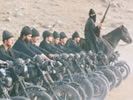Eye For Film >> Movies >> Have You Another Apple (2007) Film Review
This surreal, mythical feature from Iranian auteur Bayram Fazli, has some very intriguing features but remains something of an enigma, with Fazli unwilling to settle on a definite tone for the film. He is trapped somewhere between farce and tragedy, leaving too many ambiguities in a film which is essentially a battle between good and evil.
Set in a distant land of ancient history and legendary wealth, the film depicts the brutal regime of "a powerful tribe, who were aggressive and dangerous and became the undisputed rulers of a docile and compliant people". From this epic introductory statement we might imagine ourselves about to embark upon a journey akin to Stanley Kubrick’s Spartacus or Akira Kurosawa’s The Hidden Fortress, but the reality is somewhat different, as we are led into a middle-eastern setting which is somewhere between the recent past and the distant future, with echoes of ancient mythology and post-apocalyptic desolation thrown in for good measure.

Fazli’s mis-en-scene is certainly laudable, encompassing, as it does, a variety of motifs and genres, creating a heady cocktail of cinematic flavours. The film’s title Have You Another Apple? refers to the Tantalus myth which is brought to life in one memorable scene involving live burials and apples. The cast of characters includes other notable references to mythology, such as the sleeping village, the community of beggars, the sickle bearers, and the hero himself who, despite being fat and bald, can apparently run as fast as a horse – an ability which will be put to the ultimate test at the climax of the film.
I’ve described the unnamed man as a hero, but this is certainly a questionable description, since his initial actions of heroism are purely an accidental by-product of his selfishness and obsessive greed. Worse than the selfishness, however, are his misguided attempts to help to organise a rebellion against the sickle bearers, and the film also offers ample evidence to suggest that our ‘hero’ is being used by the sickle bearers as a tool to control the masses.
If the hero is problematic, then the sickle bearers themselves are a veritable conundrum. At times they are presented as evil incarnate, faceless, ruthless monsters capable of massacring whole villages, but in other scenes they appear somewhat inept and even vaguely farcical. They slaughter whole tribes without batting an eyelid and then allow the hero to escape via the most ridiculous of scenarios, with an ineptitude which would make a Bond villain blush. This is symptomatic of the rest of the film in that it refuses to decide whether to take itself seriously or to attempt to find comedy within the bleakness and tragedy of the situation.
Far be it from me to criticise a director for creating complex characters and blurring the distinction between good and evil, but that’s not what Fazli achieves here. From the very beginning the sickle bearers are a vicious and brutal evil, and the other tribes, whilst not always entirely sympathetic, are unquestionably ‘good’, if only by virtue of moral relativism.
The mythology of the film seems to offer the prospect of hope and redemption amid the bleakness of the sickle bearer’s brutal dictatorship, and yet Fazli only seems interested in creating this mythology in order to deflate it. The film ultimately leaves the viewer with a bitter aftertaste, as though what has gone before will not be redeemed by what is to come. This, then, is not just another straightforward tale of the victorious rebellion of good people in the face of an evil regime, but nor is it a film which is likely to leave you with a great sense of inspiration or fulfilment.
Reviewed on: 19 Jul 2009


















